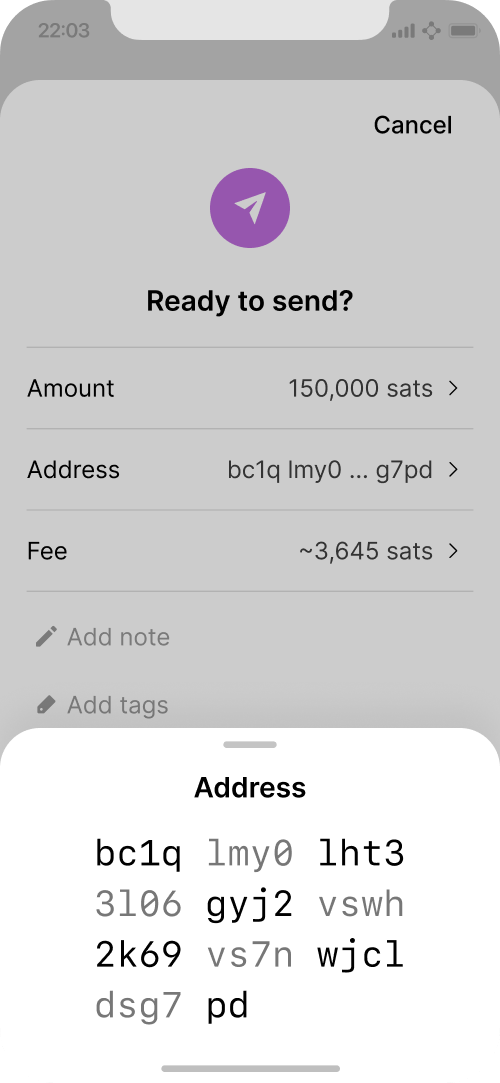Bitcoin Address 101: The Ultimate Beginner's Guide
This comprehensive guide demystifies Bitcoin Addresses. Learn about their fundamental building blocks and why they matter to you.

Every bitcoin transaction that happens globally requires a destination, a specific location where bitcoin is stored or sent. That destination is known as a bitcoin Address. Just like how you need a postal address to send a letter, in bitcoin technology, you need a bitcoin address to send or receive bitcoin.
Understanding a bitcoin address is vital to interact with bitcoin. It allows us to understand where our Bitcoins are stored, where we are sending our bitcoin, or where we are receiving Bitcoins from.
If bitcoin is a global post office, then bitcoin addresses are the P.O boxes. It's the cornerstone of how bitcoin transactions are processed, and without bitcoin addresses, it would be impossible to use bitcoin.
Breaking It Down: Your Simple Guide to Understanding Bitcoin Address
A bitcoin address is a string of alphanumeric characters that represent the destination of a bitcoin transaction.

Bitcoin address like your email address or home address, but for bitcoins. Every bitcoin wallet has at least one bitcoin address, which is publicly available and can be shared with others to send or receive bitcoin.
What sets the bitcoin address apart is its security and anonymity. It's derived from the public key through a complex mathematical algorithm, which makes it virtually impossible to reverse-engineer the original public key, ensuring the security of your bitcoin.
Additionally, since the bitcoin address doesn't contain any personal information, your identity remains anonymous when dealing with bitcoin transactions.
Behind the Scenes: Bitcoin Address in Layman's Terms
The bitcoin address, though it might seem complex, is made up of a few basic building blocks:
- Public Key: The Public Key is a key part of a key pair used in asymmetric cryptography, with the other being the Private Key. The Public Key is used to derive the bitcoin address.
- SHA-256 and RIPEMD-160 Hash Functions: These are cryptographic functions used to transform the Public Key into a bitcoin address. SHA-256 is applied first, followed by RIPEMD-160.
- Base58Check Encoding: This encoding scheme is used to represent the Bitcoin Address in an alphanumeric format that is user-friendly and resistant to typing errors.
The bitcoin address was introduced as a part of bitcoin's original design by Satoshi Nakamoto. It was designed to provide a secure and pseudonymous way for users to send and receive bitcoin.
Bitcoin address solves the problem of identifying where a transaction should be sent while maintaining the user's privacy and security.
In a typical scenario, if Alice wants to send bitcoin to Bob, she needs to know Bob's bitcoin address.
Bob would generate his bitcoin address from his Public Key and share it with Alice.
Alice then inputs this address into her bitcoin wallet to send bitcoin.
Understanding this process is crucial as it underpins every bitcoin transaction. Sending to a wrong or invalid address might lead to irreversible loss of bitcoin.
Apart from the standard bitcoin addresses, you should be aware of a variation known as a Segregated Witness or SegWit address. SegWit addresses (beginning with 'bc1') provide benefits in terms of transaction speed and scalability.
However, not all wallets or exchanges support SegWit addresses yet.
Seeing Is Believing: Real-Life Applications and Scenarios of Bitcoin Address
A bitcoin address is a fundamental aspect of how bitcoin transactions are processed. Here's how it's being used in real-world scenarios:
- Bitcoin Transactions: At its core, the bitcoin address is the destination to which users send bitcoin. When you send bitcoin to someone, you use their bitcoin address. When someone sends bitcoin to you, they use your address.
- Wallet Management: Bitcoin addresses are an integral part of bitcoin wallets. Wallets automatically generate bitcoin addresses for users and keep track of them to facilitate transactions. A single Bitcoin wallet can create and manage numerous bitcoin addresses.
- Providing Payment Options: Many businesses now accept bitcoin as a form of payment. These businesses will provide a bitcoin address at checkout for customers to send their payment to.
- Charitable Donations and Tips: Many charities now accept donations in bitcoin. To do this, they provide a bitcoin address to which donors can send funds. Similarly, content creators sometimes share their bitcoin address to receive tips or payments from fans.
Understanding bitcoin addresses can provide an edge in several scenarios:
- Security: Knowing how a bitcoin address is generated can help you better understand bitcoin's security mechanisms. This understanding can be helpful when choosing a bitcoin wallet or platform based on their security protocols.
- Error Avoidance: Understanding that bitcoin addresses are unique and that transactions are irreversible can emphasize the importance of double-checking addresses before initiating transactions, helping you avoid costly mistakes.
- Privacy Awareness: Understanding that while bitcoin addresses are pseudonymous (not directly linked to your real-world identity), they are not completely anonymous. All bitcoin transaction data, including the sending and receiving addresses, are stored publicly on the bitcoin blockchain. This knowledge can help you take steps to protect your privacy when transacting with bitcoin.
- Optimization of Transaction Costs: Familiarity with the structure of bitcoin addresses, such as SegWit addresses, can help you optimize transaction costs as some address types can offer lower transaction fees.
Bitcoin Address and You: The Impact on Your Life and Society
Understanding bitcoin addresses has the potential to impact both your personal and financial decisions in the following ways:
- Financial Responsibility: Bitcoin transactions are irreversible, and if you accidentally send bitcoin to the wrong address, those funds are gone. Understanding how bitcoin addresses work can make you more cautious and meticulous when making transactions, fostering a greater sense of financial responsibility.
- Security Consciousness: Knowledge about bitcoin addresses can enhance your understanding of security measures and thus influence your decision when choosing a bitcoin wallet or an exchange. For instance, you might opt for a wallet that generates a new address for each transaction to improve anonymity.
- Investment Decisions: As more people understand bitcoin addresses and, by extension, Bitcoin, we may see a rise in bitcoin's adoption. This could potentially influence your decision to invest in Bitcoin or businesses related to bitcoin.
- Career Opportunities: As bitcoin continues to evolve, there is an increasing demand for people who understand the technology that underpins it. Mastering aspects like bitcoin addresses could open doors to new career opportunities.
On a societal level, widespread understanding of bitcoin addresses could have several implications:
- Increased Adoption of Bitcoin: As more people understand the mechanisms behind bitcoin like bitcoin addresses, we're likely to see higher rates of bitcoin adoption. This could revolutionize industries like ecommerce and remittances, where bitcoin can offer lower fees and faster transactions.
- Greater Financial Inclusion: Bitcoin is accessible to anyone with an internet connection. A better understanding of bitcoin addresses could encourage more people to use bitcoin, fostering greater financial inclusion, especially in regions where access to traditional banking services is limited.
- Enhanced Privacy and Security: With the knowledge of bitcoin addresses and how they work, people can adopt best practices to protect their transactions and maintain privacy. This could significantly enhance personal security and privacy in financial transactions.
- Change in Regulations: Increased understanding and adoption of bitcoin could prompt regulatory bodies to revise or implement new laws and guidelines regarding the use of cryptocurrencies.
Facing the Music: Addressing Common Misconceptions and Fears about Bitcoin Address
Bitcoin addresses, being integral to the operation of the bitcoin network, often fall prey to misconceptions and fears. Let's debunk the top five:
- Misconception: Bitcoin addresses are linked to personal identity. Reality: Bitcoin addresses are generated randomly and do not contain any personal information about the user. While transactions are public on the blockchain, they are linked to addresses, not identities.
- Fear: Bitcoin addresses can be hacked and stolen. Reality: A bitcoin address in itself cannot be hacked. Security issues arise when your private key (which is used to access your bitcoin) gets compromised. It's crucial to keep your private keys secure and use reliable wallets.
- Misconception: You can only use a bitcoin address once. Reality: While it is possible to use a bitcoin address multiple times, using a new address for each transaction can help improve your privacy. However, the fact that an address can be reused doesn't mean it has to be reused.
- Fear: If you lose your vitcoin address, you lose your bitcoin. Reality: Your bitcoin is not actually stored in the address; it is stored on the bitcoin blockchain. Your bitcoin address is a means for people to send you bitcoin, and your private key is what allows you to access and spend your bitcoin. If you lose your address, you can still access your bitcoin as long as you have your private key.
- Misconception: Bitcoin addresses and private keys are the same. Reality: A bitcoin address and a private key are two different things. An address is like your bank account number, which people use to send you bitcoin. A private key, on the other hand, is like your bank account password, which you use to access and manage your bitcoin. It's critical to never share your private key with anyone.
Each of these misconceptions or fears often stems from a lack of understanding about how bitcoin works. By educating ourselves, we can dispel these misconceptions and engage with bitcoin more confidently and securely.
The Road Ahead: Navigating Bitcoin Address with Confidence
After this detailed exploration of bitcoin addresses, let's boil down the essential takeaways for a beginner:
- Understanding Bitcoin Addresses: A bitcoin address is a unique identifier that allows you to receive bitcoin in transactions. Think of it as an account number in the bitcoin network.
- Importance of Bitcoin Addresses: Your bitcoin address is critical in making bitcoin transactions. It's the public-facing part of your Bitcoin account, allowing others to send bitcoin to you.
- Security and Privacy: Your bitcoin address isn't linked to your identity, which aids in the privacy aspect of bitcoin. However, it's also crucial to maintain a secure hold on your associated private key, as losing it means losing access to your Bitcoins.
Now, the road to mastering the concept of bitcoin addresses doesn't end here. To deepen your understanding, these reliable sources can be your guide:
- SoFi: Understanding Bitcoin Addresses
- Cash App: Learning About Bitcoin Addresses
- Swan Bitcoin: Address Reuse and Its Discouragement
And what can you do today to start engaging with bitcoin addresses safely and effectively? Begin by setting up a bitcoin wallet with a reliable provider.
From there, you can start familiarizing yourself with the process of generating and using bitcoin addresses.
Practice receiving small amounts of bitcoin from a trusted friend or family member, or even from a bitcoin faucet. Most importantly, remember to protect your private keys at all times, as they are the gateway to your bitcoin.
